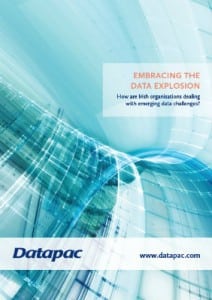By Karen O’Connor, general manager service delivery
A zettabyte equals one trillion gigabytes, or, a thousand trillion megabytes. To put that in context, one zettabyte is equal in memory to that of 75 billion iPads, 1,000 top-of-the-line data centres, or the entire contents of Netflix and YouTube combined several times over.
With this in mind, it is daunting to think that the amount of storage companies will have to manage globally by 2020 is approximately 44 zettabytes, according to market intelligence firm IDC. Datapac recently commissioned research looking at how Irish organisations are dealing with this ‘data explosion’ – read the full survey report HERE.
By surveying almost 200 senior Irish IT professionals about the risks, struggles and successes of managing data in the enterprise, Datapac has uncovered that many organisations are falling short by using legacy systems, storing data in unsecure locations, not having documented processes in place, failing to test regularly and being unable to retrieve mission-critical data in an acceptable timeframe.
With the levels of data increasing at such a fast pace, it’s important to understand how to store your data, and here are a few simple tips:
- Store it securely
- Remove outdated practises
- Test your data storage solution regularly
- Back it up regularly
- Prepare for the worst
- Test it regularly!
It may seem obvious, but many organisations fall short at this all important first hurdle. Whether on premise, in the cloud, or a hybrid combination of, make sure it is secure. Our research shows more than 20% of Irish companies store data in an unsecure location.
Many companies still use legacy practices like storing data on back-up tapes and disks and taking them home for the weekend. This used to be the norm, but with a variety of storage options now available, it is no longer acceptable.
Worryingly, more than 25% of Irish organisations never test their data recovery. Lack of testing is a worrying trend and can have disastrous consequences – having the best-in-class solutions in place means nothing if they’re not operating effectively. Test at least twice a year or even more frequently for mission-critical data.
Depending on size and risk profile, many organisations should back up data in real time. While historically this practice has been inhibited by poor bandwidth availability and speeds, advances in these areas has seen it become more prevalent with 25% of Irish organisations now doing so. A further 63% back up data daily. If your organisation is in the minority that backs it up weekly, monthly or even less regularly, ask the question – what the impact be on my business if I lost a few days, a week, or a month’s worth of data?
It’s important to be aware of the dangers that are out there. While 80% of organisations are prepared for natural disasters such as flooding, fire and prolonged power loss; less than 50% are unprepared for a cyberattack, which is a far more likely occurrence.
OK. If you’ve been paying attention you’ll probably recognise that we’ve already given you this advice just 10 seconds ago but it really cannot be stressed enough – any solution linked to your data needs to be tested regularly!!!
Fortunately, there is a wide range of options available to meet the unique demands of each organisation and an optimal solution can be designed to meet current and future business needs. Choose an experienced and highly accredited service provider, such as Datapac, that can understand your organisation’s unique set of needs and match this with an appropriate and scalable solution. Ensure they provide a proactive service that will ensure any potential issues are identified and rectified before they become real live problems.
FREE WHITEPAPER
Embracing The Data Explosion
How are Irish organisations dealing with emerging data challenges?
Download here!
Register for upcoming events
-
 "At Barretstown, we rebuild the lives of children, and their families, affected by childhood cancer and other serious illnesses. We serve 5,000 campers a year and have 1200 volunteers each year. Communication is crucially important and Datapac has helped us to streamline, improve and ensure efficiency."
"At Barretstown, we rebuild the lives of children, and their families, affected by childhood cancer and other serious illnesses. We serve 5,000 campers a year and have 1200 volunteers each year. Communication is crucially important and Datapac has helped us to streamline, improve and ensure efficiency." -
 "Datapac has provided us with a fantastic product and world-class levels of service and support. Whenever people ask me about our experience with Datapac I’m always ready to sing their praises and I would happily recommend their services to any organisation."
"Datapac has provided us with a fantastic product and world-class levels of service and support. Whenever people ask me about our experience with Datapac I’m always ready to sing their praises and I would happily recommend their services to any organisation." -
 "For many years Datapac has been our sole supplier for the maintenance of Personal Computers and Peripherals in Ireland. Through their Service Centres in Wexford and Dublin, Datapac provides excellent support to our businesses throughout the country and consistently meets the SLA targets which we have set. The skill, expertise and experience of their engineers and other technical support personnel are of the highest standard."
"For many years Datapac has been our sole supplier for the maintenance of Personal Computers and Peripherals in Ireland. Through their Service Centres in Wexford and Dublin, Datapac provides excellent support to our businesses throughout the country and consistently meets the SLA targets which we have set. The skill, expertise and experience of their engineers and other technical support personnel are of the highest standard." -
 “The value of dealing with an HP Gold partner in this process can’t be underestimated. Datapac provide us with a local touch and can cover the full range of our IT requirements, but when there is a specific technical requirement like this, they can bring the specialist technical resources of HP to the table. HP and Datapac had a thorough discussion with us around our requirement - and had really done their homework - and then were able to provide us with a very highly specified test platform for us to prove the application on before we committed to purchase.”
“The value of dealing with an HP Gold partner in this process can’t be underestimated. Datapac provide us with a local touch and can cover the full range of our IT requirements, but when there is a specific technical requirement like this, they can bring the specialist technical resources of HP to the table. HP and Datapac had a thorough discussion with us around our requirement - and had really done their homework - and then were able to provide us with a very highly specified test platform for us to prove the application on before we committed to purchase.” -
 Datapac understands our needs and requirements and has the expertise and experience to follow through on all our requests. Our constant need to reduce costs has been assisted by Datapac's ability to suggest alternative solutions and methods whilst improving both efficiency and productivity. Our partnership with Datapac is akin to having an IT department on site that we simply could not provide ourselves.
Datapac understands our needs and requirements and has the expertise and experience to follow through on all our requests. Our constant need to reduce costs has been assisted by Datapac's ability to suggest alternative solutions and methods whilst improving both efficiency and productivity. Our partnership with Datapac is akin to having an IT department on site that we simply could not provide ourselves.
